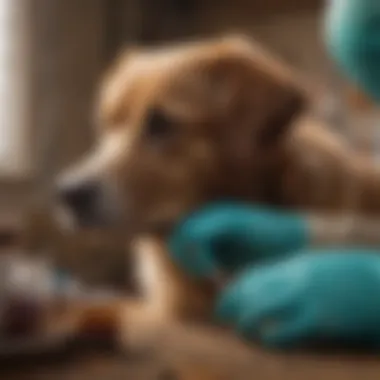What to Do If Your Dog Has Been Poisoned: A Comprehensive Guide


Pet Care Essentials
When it comes to the well-being of your furry companion, pet care essentials play a crucial role in ensuring a healthy and happy life for your dog. Daily nutrition requirements should be meticulously met, with a balanced diet tailored to your dog's specific needs. Regular exercise and playtime are instrumental for maintaining optimal physical and mental health. Grooming tips such as bathing, brushing, and nail trimming are vital not only for your dog's appearance but also for their overall hygiene. Health and wellness check-ins with your veterinarian help detect any potential issues early on, ensuring prompt intervention if needed.
Behavior & Training
Understanding your pet's body language is key to effective communication and bonding. Basic training techniques, such as obedience commands and housebreaking, establish a foundation for a well-behaved dog. Addressing behavioral concerns requires patience and consistency, with positive reinforcement being a cornerstone of training. Socialization tips help your dog become well-adjusted to different environments and interactions, reducing anxiety and aggression.
Pet Home Environment
Creating a pet-friendly space in your home involves strategic planning to ensure your dog's safety and comfort. Implementing safety measures and avoiding hazards such as toxic plants and small ingestible objects are paramount. Choosing the right toys and accessories promotes mental stimulation and prevents boredom. Setting up a comfortable resting area with a cozy bed or crate provides your dog with a secure retreat within your home.
Pet Health Issues
Recognizing signs of illness early on is crucial for prompt treatment and recovery. Regular preventative care measures such as vaccinations and parasite control help maintain your dog's health and prevent disease. Understanding common ailments like allergies, digestive issues, or joint problems empowers you to address them effectively. Emergency preparedness, including knowing where the nearest veterinary clinic is and having a first aid kit on hand, can make a significant difference in critical situations.
Recognizing Poisoning Symptoms
In the realm of pet care, recognizing poisoning symptoms holds paramount importance. It serves as the first line of defense in ensuring the well-being of our beloved furry companions. By being attuned to the signs of poisoning, pet owners can swiftly take action to mitigate the negative effects on their pets' health. Additionally, prompt recognition of poisoning symptoms enables timely intervention, potentially saving the life of a poisoned animal. As such, understanding and being able to identify these symptoms are essential pillars of responsible pet ownership.
Physical Symptoms
Vomiting
Vomiting, a prevalent sign of poisoning in dogs, plays a critical role in alerting pet owners to a potential toxic exposure. The act of vomiting serves as the body's natural mechanism to expel harmful substances ingested by the canine. This expulsion process helps rid the body of the toxic agent, preventing further absorption and reducing overall toxicity levels. Pet owners must pay close attention to the frequency and contents of the vomit, as these details can offer valuable insights into the type of poison involved and the severity of the situation.
Diarrhea
Diarrhea is another common physical symptom of poisoning in dogs. It manifests as loose, watery stools and can indicate gastrointestinal distress caused by toxic substances. The presence of diarrhea is a crucial indicator that the dog's digestive system is reacting adversely to a toxic agent. Monitoring the frequency and consistency of diarrhea is imperative for assessing the dog's condition and informing veterinary professionals about the severity of the poisoning incident.


Excessive Drooling
Excessive drooling, or hypersalivation, is a noteworthy sign of poisoning that can signal neurologic or oral exposure to toxic substances. Dogs experiencing excessive drooling may exhibit a heightened flow of saliva beyond normal levels. This symptom often indicates irritation or damage to the oral cavity or neurological pathways due to ingested poisons. Pet owners must recognize excessive drooling as a potential red flag and seek immediate veterinary assistance to address the underlying cause.
Lethargy
Lethargy, characterized by abnormal tiredness or lack of energy, is a significant physical symptom of poisoning that can indicate systemic toxicity in dogs. Poison-induced lethargy may manifest as reduced responsiveness, reluctance to move, or overall weakness in the affected animal. Identifying lethargy in a poisoned dog is crucial as it signifies a compromised state of health and necessitates urgent medical attention to prevent further deterioration.
Behavioral Changes
As a complement to physical symptoms, behavioral changes provide vital clues to the onset of poisoning in dogs. These alterations in demeanor and actions can offer valuable insight into the affected animal's neurological and psychological response to toxic exposure. By understanding and recognizing these behavioral shifts, pet owners can take proactive steps to safeguard their pets' health and well-being.
Agitation
Agitation, characterized by restlessness or irritability, is a prominent behavioral symptom of poisoning in dogs. Dogs experiencing agitation may display pacing, vocalization, or other signs of emotional distress. This behavioral change serves as an indicator of internal discomfort or nervous system involvement due to a toxic insult. Recognizing agitation allows pet owners to address the dog's distress promptly and seek appropriate veterinary care to manage the poisoning incident.
Confusion
Confusion, marked by disorientation or mental fogginess, is a significant behavioral manifestation of poisoning in dogs. Dogs exhibiting confusion may appear disoriented, exhibit altered responsiveness, or struggle with coordination. This cognitive impairment can stem from neurotoxic substances affecting the brain function of the poisoned animal. Identifying confusion in a dog can prompt pet owners to seek urgent professional help to assess and address the underlying cause of the cognitive changes.
Seizures
Seizures, sudden and uncontrollable bursts of electrical activity in the brain, are alarming behavioral symptoms of poisoning that require immediate attention. Dogs having seizures due to toxic exposure may exhibit convulsions, tremors, or loss of consciousness. Seizures indicate a severe neurological response to poison and necessitate rapid intervention to prevent further harm to the animal. Pet owners witnessing seizures in their dogs must prioritize seeking emergency veterinary care to safeguard the affected pet's welfare.
Collapsing
Collapsing, the sudden inability to maintain an upright position, is a critical behavioral red flag indicating a severe poisoning incident in dogs. Dogs that collapse due to poisoning may experience profound weakness, sudden loss of consciousness, or an inability to support their own body weight. Recognizing collapsing as a grave symptom of toxicity underscores the urgent need for professional veterinary assistance to stabilize the affected dog's condition and initiate appropriate treatment strategies.
Immediate Actions to Take
When faced with the alarming situation of a poisoned dog, immediate actions carry critical significance in ensuring the well-being of your beloved pet. This section serves as a cornerstone of the comprehensive guide, laying down the essential steps to be taken promptly and decisively. Prompt action can be a pivotal factor in saving your dog's life, underscoring the urgency and importance of this section.


Taking immediate actions not only minimizes the effects of the poison but also sets the stage for subsequent treatment and care. Contacting a vet promptly can provide valuable guidance and intervention that can be life-saving for your furry friend. The swiftness with which you respond to the poisoning incident can directly impact the outcome, making this section irreplaceable in its importance.
One of the primary considerations in this section includes the urgency of seeking professional assistance. Veterinary expertise is vital in evaluating the situation, determining the type of poison involved, and administering the appropriate treatment. Timely communication with a vet can prevent further complications and tailor the response to the specific poison ingested by your dog.
Moreover, immediate actions go beyond just contacting a vet. This section also delves into other crucial steps such as inducing vomiting under professional guidance, if deemed necessary. Each action taken promptly in response to a poisoning incident plays a pivotal role in determining the outcome. Therefore, understanding and acting upon the advice provided in this section are paramount for all pet owners facing such emergencies.
Contact a Vet
Provide information on the suspected poison
Dealing with poisoning incidents requires a meticulous approach, and providing precise information about the suspected poison is of paramount importance. The accuracy and comprehensiveness of the information you convey to the vet can significantly impact the course of treatment and ultimately, your dog's recovery.
Specifically, detailing the potential source or substance ingested by your dog can assist the vet in diagnosing and devising an effective treatment plan. Information about the quantity ingested, the duration since ingestion, and any notable symptoms exhibited by your dog can aid the vet in making informed decisions.
In the context of this article, emphasizing the significance of accurately providing information on the suspected poison underscores the proactive role pet owners play in assisting veterinary professionals. This proactive approach can streamline the veterinary intervention process and contribute to a more targeted and effective treatment strategy.
Additionally, highlighting the importance of this step reinforces the collaborative nature of addressing poisoning incidents. By offering relevant details about the potential toxin, pet owners empower vets to deliver timely and appropriate care, emphasizing the indispensable role of clear and precise communication in such critical situations.
Follow the vet's instructions
Following the vet's instructions meticulously is a foundational aspect of effectively managing a poisoning incident. Veterinary professionals provide tailored guidance that is specifically designed to address the unique circumstances of your dog's poisoning, necessitating strict adherence to their directives.
Key characteristics of following the vet's instructions include strict compliance with prescribed medication, dosage, and treatment protocols. The vet's extensive expertise in handling poisoning cases equips them with the knowledge to navigate complexities and administer suitable remedies.
In the scope of this article, the emphasis on adhering to veterinary recommendations underscores the trust and reliance placed on professional expertise during emergencies. By following the vet's instructions diligently, pet owners can optimize the chances of a successful recovery and mitigate potential risks associated with poisoning incidents.
Moreover, the unique feature of this aspect lies in its personalized approach - each set of instructions is tailored to the specific circumstances of the poisoning incident. This individualized guidance ensures that the treatment plan aligns closely with your dog's needs, reflecting a holistic and bespoke approach to managing poisoning cases.
Inducing Vomiting
Only if advised by the vet


The decision to induce vomiting as a response to a poisoned dog should only be undertaken under the explicit advice of a trained veterinarian. This precaution ensures that the process is carried out safely and effectively, minimizing potential risks or complications.
The key characteristic of this guideline underscores the importance of professional oversight in potentially inducing vomiting. Veterinarians possess the expertise to evaluate whether vomiting is a suitable course of action based on factors such as the type of poison ingested and the time elapsed since ingestion.
In the context of this article, the prudent recommendation to induce vomiting if and only if advised by the vet reflects a cautious and responsible approach to managing poisoning incidents. By relying on trained professionals to make this decision, pet owners can leverage specialized knowledge and experience to safeguard their dog's well-being.
Furthermore, the unique feature of this aspect lies in its emphasis on individualized care and expertise. By entrusting the decision to induce vomiting to veterinary professionals, pet owners demonstrate a commitment to prioritizing their dog's health and safety through informed and judicious action.
Do not induce vomiting if the poison is corrosive
In circumstances where the ingested poison is identified as corrosive, the recommendation is to refrain from inducing vomiting. Corrosive substances have the potential to cause further damage to the esophagus and digestive tract if brought back up, making vomiting a counterproductive and harmful response in such cases.
The key characteristic of this guideline lies in its emphasis on risk mitigation and harm prevention. By advising against inducing vomiting for corrosive poisons, the focus shifts towards minimizing additional harm to the affected organs and tissues, aligning with the overarching goal of preserving your dog's health.
Within the context of this article, the caution against inducing vomiting for corrosive substances underscores the nuanced decision-making required in handling poisoning incidents. This tailored recommendation reflects a careful and considered approach that prioritizes caution and recognizes the specific risks associated with corrosive toxins.
Moreover, the unique feature of this aspect underscores the importance of discernment and guidance in responding to poisoning cases. By refraining from inducing vomiting in situations involving corrosive substances, pet owners exhibit a commitment to preventing further harm and entrust veterinary professionals with determining the most appropriate course of action.
Avoiding Common Mistakes
When your furry friend is in distress due to poisoning, Avoiding Common Mistakes becomes a critical aspect of handling such a delicate situation. The significance of this topic lies in the potential to prevent further harm or complications to your beloved pet. By understanding and adhering to the essential guidelines outlined in this section, pet owners can steer clear of errors that may exacerbate the already precarious situation. It is vital to emphasize the importance of precise and informed actions, which can only be achieved by avoiding common mistakes that might arise in moments of panic and confusion, reflecting the gravitas the implications of these errors can have on your pet's well-being.
Do Not Administer home remedies without professional advisory
A fundamental aspect of the Avoiding Common Mistakes section is the staunch warning against administering home remedies without seeking professional guidance. Misguided attempts to alleviate symptoms through homemade concoctions or treatments can inadvertently worsen the condition of a poisoned pet. The inclination to resort to home remedies may stem from a desire to provide immediate relief, but it is imperative to recognize the potential dangers of uninformed interventions. Relying on unverified remedies can delay proper medical intervention, leading to irreversible consequences. Pet owners must comprehend the risks associated with home treatments and prioritize consulting a veterinarian for expert guidance in such critical scenarios.
Do Not Delay seeking veterinary care
Another pivotal aspect of Avoiding Common Mistakes is the avoidance of delaying the seeking of veterinary care. In cases of poisoning, time is of the essence, and any delay in accessing professional medical assistance can impact the prognosis of the poisoned pet. Prompt veterinary care is essential for diagnosing the type of poisoning and administering the appropriate treatment swiftly. Delays in seeking veterinary attention can allow toxins to further circulate in the pet's system, intensifying the severity of symptoms and complicating the recovery process. Pet owners must understand that swift action is crucial in mitigating the effects of poisoning, underscoring the critical role of immediate and competent veterinary care in safeguarding their pet's health.
Handling the Situation Calmly
Maintaining composure amidst a pet poisoning incident is a cornerstone of effective crisis management. Handling the Situation Calmly can significantly impact the outcomes and decisions made in such emergencies. The ability to remain level-headed enables pet owners to think clearly, assess the situation rationally, and promptly execute necessary steps without succumbing to panic-induced errors. By staying composed, individuals can communicate clearly with veterinarians, provide accurate information, and follow instructions meticulously. This section emphasizes the intrinsic link between a calm demeanor and the competence exhibited in managing a pet poisoning scenario, highlighting the pivotal role of emotional resilience in safeguarding the well-being of the afflicted animal.
Post-Recovery Care
Post-Recovery Care is a critical aspect of this comprehensive guide on addressing dog poisoning incidents. After your dog has been poisoned and received appropriate treatment, Post-Recovery Care plays a pivotal role in ensuring their continued well-being. This section emphasizes the importance of diligent monitoring and follow-up actions to guarantee a smooth recovery process. Post-Recovery Care encompasses various elements, including observing for lingering symptoms and implementing preventive measures to avoid future poisoning incidents. By focusing on Post-Recovery Care, pet owners can actively participate in their dog's healing journey and minimize the risks of recurrent poisoning events, thereby safeguarding their furry companions' health and happiness. ## itoring Your Dog's Health ## Mo ring Your Dog's Health is an essential component of Post-Recovery Care, allowing pet owners to track their pet's progress post-poisoning incident. 'Observing for lingering symptoms' involves keenly watching out for any residual effects or signs of toxicity that may persist despite initial treatment. This proactive approach enables early detection of potential complications and prompt intervention, supporting the dog's recovery process effectively. By emphasizing the importance of observing for lingering symptoms, pet owners can ensure comprehensive care for their beloved pets and address any recurring issues promptly. This meticulous monitoring plays a crucial role in assessing the effectiveness of the initial treatment and tailoring further care accordingly. ## Follo up with the vet ## Followin with the vet is a crucial step in ensuring your dog's full recovery and well-being. This subheading advocates for continued collaboration with veterinary professionals post-treatment to address any persisting concerns or evolving health needs. Regular follow-up visits enable vets to assess the dog's progress, conduct further tests if necessary, and provide tailored guidance on post-poisoning care. By underlining the significance of following up with the vet, pet owners can benefit from expert insights, personalized advice, and ongoing support in managing their dog's health following a poisoning incident. This coordinated approach enhances the likelihood of a successful recovery and reinforces the bond between pet owners and veterinary caregivers. ## Prevention ures ## Prevention Mea s are key to mitigating the risks of future poisoning incidents and ensuring a safe environment for pets. 'Securing toxic substances out of reach' involves maintaining a secure and inaccessible storage system for household chemicals, medications, and other potentially harmful substances. By preventing access to such hazards, pet owners can effectively reduce the chances of accidental poisoning and create a pet-friendly living space. This preventive measure not only safeguards pets but also promotes overall household safety and peace of mind for pet owners. Regularly checking your surroundings for hazards is another important aspect of proactive pet care. By systematically examining your living space for potential dangers, such as exposed wires, toxic plants, or sharp objects, pet owners can identify and eliminate risks before they pose a threat to their pets. This proactive approach minimizes the likelihood of poisoning incidents and other accidental injuries, fostering a secure and healthy environment for pets to thrive. Emphasizing prevention measures empowers pet owners to take proactive steps in safeguarding their pets' well-being and creating a secure living environment free from potential hazards.







